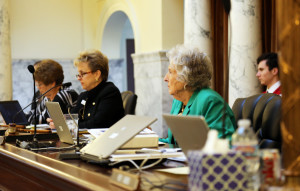The most important piece of Sherri Ybarra’s budget proposal isn’t a big money idea.
Her $300,000 request for rural schools centers is modest, compared to other line items: $56.4 million to boost teacher pay; $15 million for classroom technology; $1.2 million to pursue mastery-based learning, which would advance students through school based on their command of subject matter.

But the rural proposal is significant politically — because it represents one budget item that is uniquely Ybarra’s. Unlike the bulk of the budget request, which includes initiatives rooted in Gov. Butch Otter’s 2013 education task force, the somewhat nebulous rural proposal is a brand new initiative.
And that means it might run into trouble.
“It’s just a heavy lift,” Idaho Association of School Administrators executive director Rob Winslow said Thursday morning, during a break in Ybarra’s presentation to the Legislature’s Joint Finance-Appropriations Committee.
The political reality is simple: Three years in, the task force report has evolved into the roadmap that guides just about all things K-12. This one document directs the debate and drives the dollars.
Ybarra isn’t fighting that reality; instead, she embraced it. She prefaced her remarks Thursday by saying 16 of the task force’s 20 recommendations are still in the process of implementation — and she exhorted budget-writers to finish the job.
And Ybarra’s budget proposal pushes money into the task force recommendations. Her teacher pay line item funds the second year of the career ladder, a plan stemming from the task force report. Like Otter, she wants to restore school operational budgets to $25,696 per classroom, another task force recommendation.
Technology? A task force recommendation.
Mastery? A task force recommendation.
Even where Ybarra and Otter disagree, the differences are minimal. Ybarra requested $5 million to focus on literacy in the early grades — and revamp or replace the 20-year-old Idaho Reading Indicator. Otter wants $10.7 million, and Ybarra has no problem with his request. “It wouldn’t make much sense for me to turn that down, would it?” Ybarra told reporters after her JFAC presentation.
Both Ybarra and Otter are seeking a sizeable increase in K-12 funding; Ybarra has requested a $110 million increase, Otter wants a $116 million boost. Some legislative leaders are already saying they might come up short on Otter’s request.
So, even at $300,000, a rural school initiative might be seen as an add-on — and an idea swallowed up in the current of task force recommendations.
Ybarra gave her idea a spirited push. She spent considerable time talking up the idea during Thursday morning’s presentation — and referenced it repeatedly during a 20-minute question-and-answer session with committee members.
Ybarra envisions a clearinghouse similar to rural centers in 45 other states. Led by local superintendents, the regional centers would provide rural districts with support in a variety of areas — anything from early learning to IT support to programs to reduce dropout rates. It would be up to local superintendents to create the “menu” for the rural centers, and districts would pay for the services they want. The $300,000 would pay for support staff at the state level.
Ybarra isn’t planning to run a bill to create the rural schools centers, saying she wants to keep the idea as flexible as possible. That means it will be up to JFAC to decide whether to create and fund her ideas.
Ybarra didn’t hurt her cause with JFAC Thursday. She did her homework before her budget presentation, and was rewarded with high marks. A year after frustrating the committee with a sketchy, 17-minute presentation, she spent nearly an hour diving into the details of her 2016-17 budget proposal — and received bipartisan praise for her thoroughness.
But, to be sure, many of her budget initiatives have their origins in the task force report. The rural initiative is the exception.
Thursday’s presentation — nearly a year in the making — showed that Ybarra has learned a lot about writing a budget. The fate of the rural schools initiative hinges on whether Ybarra can champion a budget.
More reading: Details on Ybarra’s budget proposal, and Thursday’s hearing.
